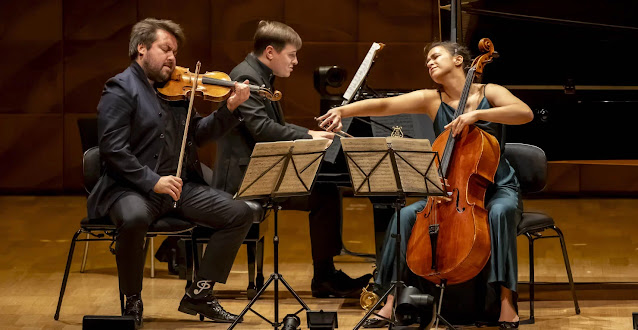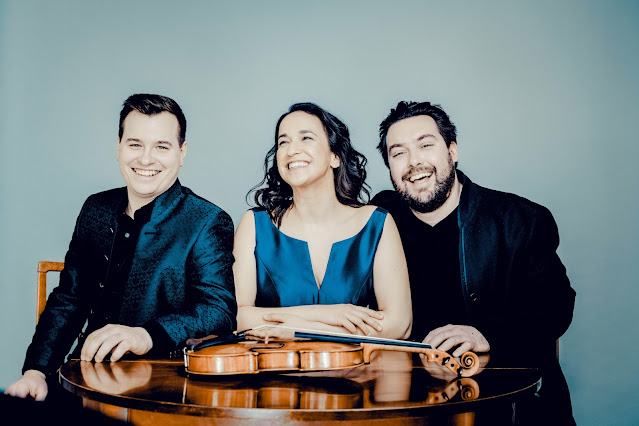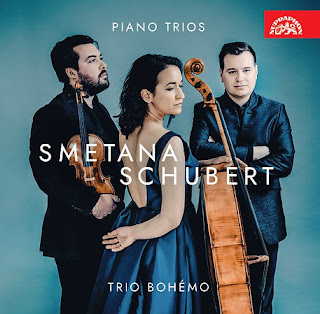 |
| Trio Bohémo |
Formed in 2019 by three Czech musicians, Matouš Pěruška (violin), Kristina Vocetková (cello) and Jan Vojtek (piano), Trio Bohémo released their debut disc on Supraphon in August 2024, featuring Schubert’s great E flat Piano Trio D929 and Smetana’s Trio in G minor Op 15. The disc has already garnered praise, and the trio has a tour of the UK during October and November 2024 [see their website for details].
I recently spoke to the three of them, via Zoom, to chat about the new disc, their attitude to programming and performing, and their fondness for England. The result turned into a lively discussion as they proved to be very engaging company.
I was intrigued by the programme for their debut disc, the pairing of Schubert and Smetana is not an obvious one, the two works were written nearly 30 years apart and they rather inhabit different worlds. Recording Smetana’s trio was an obvious choice, the three feel a deep connection with the work and the recording linked to the 200th anniversary of Smetana’s birth this year.
The recording was made at Snape Maltings, an intriguing choice for a Czech ensemble but, it turns out, a perfectly logical one. They found that it was not so easy to make the recording in the Czech Republic and Snape became a clear choice. For a start, they love England, it was the first country to help them in their career, as unknowns they received many opportunities in this country and they feel comfortable here. The trio took part in the Britten Pears Young Artist Programme for 2022-23 so they know Snape Maltings and rather fell in love with the place. Also, their producer at Supraphon suggested that they work with Andrew Keener for the recording, so it made sense to travel to the recording team rather than the other way around.
As regards the timing of the disc, they waited to make their debut recording until they felt that they had something to say about a specific piece. They did not want to make a disc for the sake of it, they wanted the recording to have impact. They did not want to spend all the money and effort on something that became just one of many. In 2023, they reached the position with Smetana’s Piano Trio that they felt it right to freeze their interpretation.
 |
| Trio Bohémo (Photo: Andrej Grilc) |
Matouš and Kristina played together at conservatoire, firstly in a string quartet and later as a violin and cello duo. Playing with Jan at European festivals led them to decide to form a trio in 2019. The restrictions of COVID, rather ironically, played a big role in their development as the three of them moved in together. Though they lived in a big house, being forced to share was challenging, they survived and learned and the trio’s dynamic is now settled. And staying together meant that in the period after lockdown when they attended events and masterclasses and had to stay in one room, they did not get on each other’s nerves! What this means is that the three share the same values outside of the music.
The trio is their musical life, all three dropped everything else when they formed the ensemble. They rehearse every day and spend a lot of time together; most of their concerts are performed together, so it is meaningful to devote their time completely to the trio.
The late Hatto Beyerle, a founding member of the Alban Berg Quartett, was the first person they had lessons with, and he is the person that they feel made them think about their approach to music. Another significant influence is Johannes Meissl in Vienna, and it was he who encouraged Matouš and Kristina to create the trio. They cherish his opinion and advice and are lucky enough to call him a friend.
For them, the piano trio repertoire feels admirably wide and for their American tour in November, they are taking a repertoire of some 22 trios. There is so much to explore and there are plans to focus on Romantic repertoire with Dvorak, Brahms and so many Mendelssohn trios. Also, they comment that their Viennese mentor has trained them well for works of the Classical period.
Their next project with Supraphon is already in the planning stages, and we are promised something Czech and something special, but not repertoire we have heard of. In May 2025 they will be giving their first orchestral concert when they play trio concertos by Vortisek and Martinu in Brno in the Czech Republic. And they are looking forward to their debut at the Rudolfinum in Prague.
Smetana, Schubert: Piano Trios – Trio Bohémo – Supraphon [further details]
Recorded at the Britten Studio, Snape Maltings, England. Producer Andrew Keener
– Recording of the Week, Presto Music (2024)
– Classical Album of the Week, The Guardian (2024)
The blog is free, but I’d be delighted if you were to show your appreciation by buying me a coffee.
Elsewhere on this blog
- On tour from New York, the Philip Glass Ensemble stopped off in Cambridge in a presentation by the Cambridge Music Festival – concert review
- Everyone clearly enjoyed themselves & brought the house down: The Sixteen in Monteverdi’s Vespers of 1610 at Temple Church – concert review
- Une messe imaginaire: Bruckner & Frank Martin from Lyon – record review
- What lies beneath: a brilliant reinvention of Judith Weir’s Blond Eckbert at the heart of ETO’s exploration of German Romanticism – opera review
- A glorious noise: from one to eight choirs in I Fagiolini’s evening of music from 17th-century Venice and Rome – concert review
- After the humans are gone, the instruments still sing and it is important to listen – Jake Heggie on his song cycle, Intonations: Songs from the Violins of Hope – interview
- Innate theatricality: composer
Adrian Sutton definitively moves out of the theatre with a challenging
yet engaging concerto for violinist Fenella Humphreys – record review - Eternity In An Hour: Keval Shah and Jess Dandy on their unique reimagining of the Bhagavad Gita – feature
- A focus on the flute: London Handel Players in a group of cantatas Bach wrote in 1724 with virtuoso flute parts – concert review
- A special treat: strong individual performances & superb ensemble in WNO’s revival of Puccini’s Il trittico – opera review
- Home









